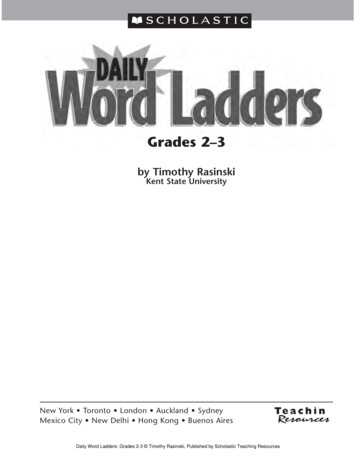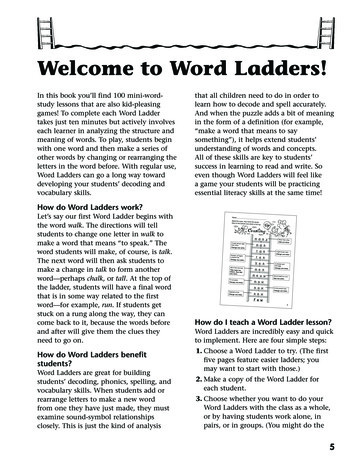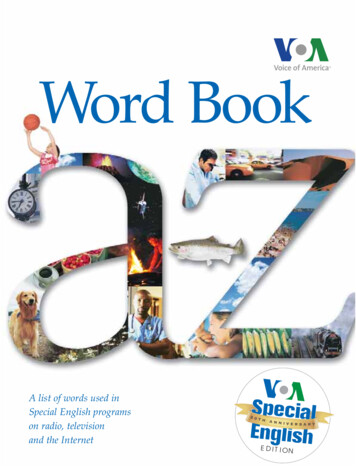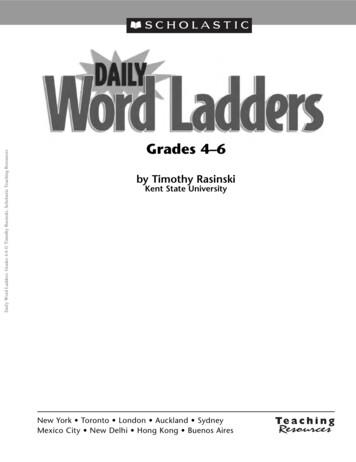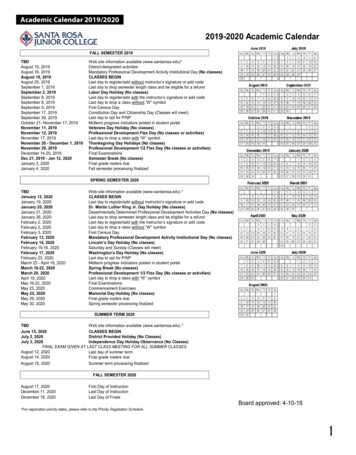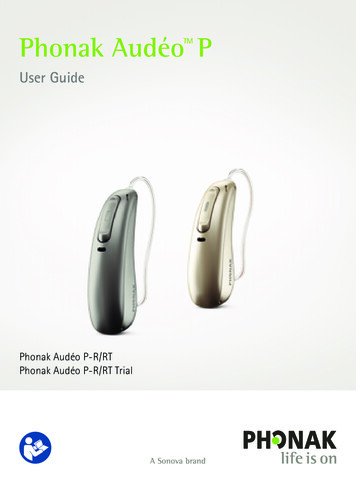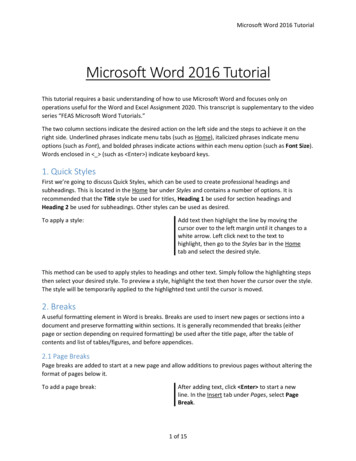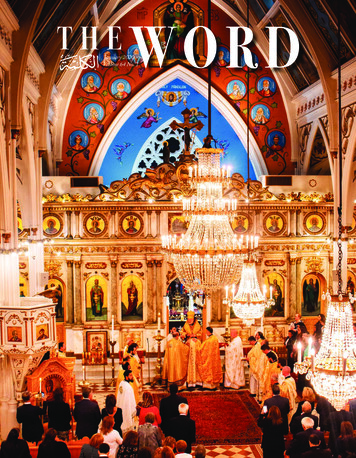
Transcription
THEWORDJanuary 2020Volume 64 No. 1
C O N T E N T S35678101415171820232426283234EDITORIALby Bishop JOHNFROM THESE STONES —A PROBLEM OF BIBLICALPROPORTIONSby Archpriest Steven C. SalarisWILLING TO GO ON A DOMESTICMISSION TRIP THIS SUMMER?BRINGING OUR WOUNDS TO CHRISTby Nicholas A. PapasM O R E T H A N W H AT W E S E Eb y F r. J o h n O l i v e rP R AY I N G F O R T H E D E PA R T E Db y F r. A n d r e w H a r m o nS T. A T H A N A S I U S A C A D E M YOF ORTHODOX THEOLOGYCHANGED MY LIFEb y S c o t t S p e i e r, M . D i v .DIOCESE OF CHARLESTON, OAKLANDA N D M I D - AT L A N T I C H O L D SA N N U A L R E T R E AT F O R D E A C O N Sb y D e a c o n N e d Tr b o v i c hARCHDIOCESAN OFFICEC O M E V I S I T W I T H S T. N E K T A R I O Sby Lindsey Weber and William WeberA P R AY E R - R O P E F O R T H EENTIRE WORLDby Archpriest Andrew Stephen DamickT H E R O A D W E TA K E T O T H E C R O S SCREED AND COMMUNITYby Gregory AbdalahO R AT O R I C A Lby Anastasia LikiardopoulosCOMMUNITIES IN ACTIONF R . C O N S TA N T I N E N A S R V I S I T SS T. S I M E O N O R T H O D O X M I S S I O Nby Karen Sibert HaddyINDIANA COUPLE DISCOVERST H E O R T H O D O X FA I T Hby David E. SumnerC O R R E C T I O N : L a s t m o n t h ’s c o v e r i c o n o f S t .John Damascus was written by Khourieh RandaAl Khoury Azar (Randa.azar@gmail.com). HisFeast Day is December 4.Letters to the editor are welcome and should include theauthor’s full name and parish. Submissions for “Communities in Action” must be approved by the local pastor.Both may be edited for purposes of clarity and space. Allsubmissions e-mailed and provided as a Microsoft Wordtext or editable PDF. Please do not embed artwork into theword documents. All art work must be high resolution: atleast 300dpi.ANNUAL SUBSCRIPTION:U.S.A. and Canada, 40.00Foreign Countries, 50.00Single Copies, 3.00The WORD (USPS626-260) is published monthly, exceptJuly and August, by the Antiochian Orthodox ChristianArchdiocese of North America at 358 Mountain Road, POBox 5238; periodicals postage paid at Englewood, NewJersey 07631-5238 and at additional mailing offices.Postmaster send address changes to The WORD, 358Mountain Road, PO Box 5238, Englewood, NJ 076315238ISSN 0043-7964www.antiochian.org.Canada Post Publication Agreement No. 40043404Return Canada address toAmerican International Mail, STN A – BOX 697, WindsorON N9A 6N4, Canada22 JanuaryJanuary20162020ERATIPOCON OWORDC O V E R : S T. N I C H O L A S , B R O O K LY N , N E WY O R K C E L E B R AT E S 1 2 5 T H A N N I V E R S A R YCNOOTHEEDITORIALNEW YEAR’S RESOLUTIONERATIOPVolume 64 No.1January 2020etropolitan JOSEPH offersour parishes, clergy, and organizations the Archdiocese Board of Trustees as themodel of cooperation, mutual respect, honest exchange of ideas, sharing ofhopes and disappointments, generosity and love.These are the positive traits that make servingGod as Christian stewards in our Archdiocese ajoy. Archdiocese Board members make great efforts to attend and participate in Board meetings,often traveling an entire day and staying for daysat their personal expense for each meeting. Eachis appointed to a leadership responsibility withinthe Archdiocese department structure, or serveson special committees. They prayerfully consider all the issues presented, and use their personaland professional gifts whenever appropriate. People rarely speak out of turn, and always with respect for the time of others. In other words, Boardmembers don’t speak just to speak, thus keepingthe meetings efficient.The clergy of our Archdiocese are well-trainedand very dedicated. They have offered up theirlives to God, and God has given them to theparishes under the leadership of MetropolitanJOSEPH and our diocesan bishops. Their role isto live among the faithful of the community asexamples, to lead the community at the altar inworship, and to guide the community, wherever itis gathered, with love and respect. The faithful, inturn, are given all their resources and gifts by Godto work with the clergy and each other honestly and cooperatively. Together, they build up theChurch. Like a marriage, each is to obey, love, andserve the other, faithfully discerning and following the will of God. This requires an assumptionby everyone of good will, working to understandeach other, refraining in criticism from usingwords like “always” and “never,” checking to seethat our understanding of things is correct, andhumbly seeking God’s will.When disagreements occur, as we expect ina fallen world, we are wise to deal with the issues at hand, never questioning the authenticityor motivations of the other. Let the conflict beabout the issues, and never personal. There is noroom in the Church for pride and egotism. TheChurch is God’s. It has been consecrated to Himand it originates in Him. We are created to cooperate with Him. It is He who lives with us in HisChurch, and who dwells with us in our bodies,which are also called temples of God, or of theHoly Spirit.Metropolitan JOSEPH and the current Boardof Trustees of the Archdiocese have dedicatedthemselves to transparency, accurate reporting, insurance protection, and full disclosure ofall the properties and funds of the Archdiocese,The Word3
The Most ReverendMetropolitan JOSEPHThe Right ReverendBishop BASILThe Right ReverendBishop THOMASThe Right ReverendBishop ALEXANDERThe Right ReverendBishop JOHNThe Right ReverendBishop ANTHONYThe Right ReverendBishop NICHOLASFounded in Arabic asAl Kalimat in 1905by Saint Raphael (Hawaweeny)Founded in English asThe WORD in 1957by Metropolitan ANTONY (Bashir)Editor in Chief Bishop JOHNAssistant Editor Christopher HumphreyDesign Director Donna Griffin AlbertEditorial Board Fr. Michel NajimFr. Patrick O’GradyFr. Thomas ZainFr. Andrew DamickFr. Nicholas BelcherFr. John OliverFr. Chad HatfieldKh. Erin KimmetPeter SamoreAnn Bezzeridesincluding the chanceries, camps, and parishes. To accomplish this, Fuaz ElKoury, Vice Chairman, and Salim Abboud, Chief Financial Officer, have askedthe cooperation of the parishes to gather this information. They have solicitedthe assistance and support of fellow Board members, Archdiocese staff, bishops,clergy and financial professionals in this colossal task.The Archdiocese is also trying to update its databanks to communicate better with the faithful. Please be sure that your parish has listed you correctly onthe mailing list, so that you can continue to get The WORD and keep up withwhat is going on in the Archdiocese. Have you moved in the last few years? Sendyour address and e-mail to our registrar, Marlene, at registrar@antiochian.org.Metropolitan JOSEPH has also made the Archdiocese Web site a priority, recognizing that all the faithful have many fine ideas and activities to sharewith each other throughout our Antiochian Orthodox family. In addition to TheWORD, the Antiochian.org site is a wonderful guide to events in the Archdiocese and a trove of theological articles and information.At one time, many folks assumed that too much information about the finances of the parish and Archdiocese would confuse people and discouragecontributions. Certainly, that is not true today. The more people know the goodworks being done by the parishes and the Archdiocese, the more they are willing to participate. I am encouraged by the spirit of transparency and mutual accountability demonstrated by our Metropolitan and Board, and hope that theparishes all emulate this spirit to the building up of the churches and for theglory of God.Happy New Year!Bishop JOHNEditorial Office:The WORD2 Lydia’s PathWestborough, MA 01581-1841e-mail: WORDMAG@AOL.COMSubscription Office:358 Mountain RoadPO Box 5238Englewood, NJ 07631-5238registrar@antiochian.orgBarbecue, Blues, and BeatitudesJoin us in Memphis, June 10 -13for the 2020 Parish Life ConferenceRegister today: antiochianevents.com/miamiDIOCESE OF MIAMI & THE SOUTHEAST4 January 20202019 DOMSE PLC registration ad FINAL.indd 111/11/19 2:47 PM“FROM THESE STONES”DEPARTMENT OF MISSIONS AND EVANGELISMA PROBLEM OFBIBLICAL PROPORTIONSArchpriest Steven C. Salariswo times recently, I was a guesthomilist at another Orthodoxchurch. No problem there: I love to preach theGospel. On both occasions, Iarrived at the host parish withsermon prepared, but needed a Bible to read some OldTestament passages. To mydismay, these parishes werecompletely lacking Bibles!One parish did have a couple of Orthodox Study Bibles(just the Psalms and New Testament).Fortunately, the priest found one of his old Biblesstashed in the sanctuary. In the other instance, Icould not find a Bible anywhere in the church. Thatwas awkward.This is not just an Antiochian Orthodox problem, but a cross-jurisdictional problem in manychurches. We Orthodox like to tell people that theBible is “our book,” or “we are the same church thatcomposed the canon of the books of the Bible.” Ifwe are that proud of “our book,” then shouldn’t it befound in the church?There are several problems with Bible-lessOrthodox churches.1) It is suspicious to the casual non-Orthodox observer when they enter a churchwith no Bibles. Questions like, “Isn’tthis supposed to be the Church of theBible?” arise in one’s mind.2) It is very difficult to discuss Orthodoxy with non-Orthodox if there isnot a Bible readily available to which one canrefer. When we dialogue with those Christians who have little or no Tradition, Creeds,Church Fathers, Councils, Canons, and soforth, the only tool we have are the Scriptures.When you can point out a text and that person is able to read it for himself or herself, theeffect is sometimes astounding.3) Our worship is biblical. The sacramentsare scriptural and large parts of the texts ofliturgical services like the Divine Liturgy areeither direct quotes of Bible verses or paraphrases of them.4) Our theology is biblical. What we believeabout God, Jesus, the Holy Spirit, salvation,and so forth is found in those apostolic writings in the New Testament. Look at iconsof the ecumenical Councils. Most of themThe Word5
A PROBLEM OF BIBLICAL PROPORTIONShave the Bible as the centerpiece. We Orthodox love to talk about the divine energies andtheosis. These concepts are foreign to manynon-Orthodox until we show them theseconcepts in the Bible. For example, the Greekword for “energy” is energeia; it is unfortunately translated as “work” in our EnglishBibles. This word appears several times inthe New Testament. So, for example, Colossians 1:29 could be translated, “To this endI also labor, striving according to His energywhich energies in me mightily.” St. Paul saysthat his sacrificial service for Christ is madepossible by His divine energy. A discussionabout theosis can begin with 1 Corinthians 15.Christ is risen from the dead in a new, deified body that can walk through walls, appearand disappear, and so on. We will be raisedfrom the dead and receive a new body, justlike Jesus. Resurrection is part of theosis.Last, but not least: having Bibles in church isa courtesy to our guests and visiting clergy. Whentraveling to another church as a guest homilist, thepriest has to carry vestments, cassock, jibbe, and soforth. Not having to bring his Bible, in addition toall that, is one less thing he has to worry about, or,often enough in my case, forget.So, what can we do to rectify this problem? Theanswer is simple: purchase Bibles for the nave, thebookstore, and the altar area. Bibles provide a quickreference source for sermons, lectures, and so on.Bibles in the sanctuary are useful when that visiting priest needs to read from one during his guestsermon. Orthodox Study Bibles in the parish bookstore can be purchased by inquirers or given as giftsto newly enrolled catechumens.We are the Church that wrote the books of theNew Testament and compiled the canons of boththe Old and New Testament Scriptures. We mustuphold that legacy by having “our book” available toall who enter our parishes. It is my prayerful wishthat every one of our parishes would have Biblesavailable in the nave, the sanctuary, and the bookstore. It is a simple testimony, and primary witness,to our One, Holy, Catholic, and Apostolic Church– the Bible. Shouldn’t it be in your church?Archpriest Steven C. Salaris, PastorAll Saints of North America Church, Maryland Heights, MissouriWilling to Go on aDomestic Mission Trip This Summer?The Department of Missions and Evangelism is now offeringdomestic mission trips for the summer of 2020. For our launch, wehave partnered with Fr. Paul Abernathy and his awesome team atThe Neighborhood Resilience Project (formerly known as FOCUSPittsburgh). Learn more about what Fr. Paul is doing by watchinghis TEDx Talk in Pittsburgh at https://www.youtube.com/watch?v kcbu58p0fbA&feature emb logoWe have two sessions scheduled for July. Each session will provide an opportunity for training and service. Volunteers will return home with some ideas of how they might be catalysts for change in theirown communities. Each “trip” is 6 days, with 2 days of travel, and 4 workdays, beginning with arrival onWednesday and ending with departure the following Tuesday. The cost for food, lodging (at DuquesneUniversity), and Catalyst training is only 400 per person! For other details, including dates, fund-raisingideas, and registration, go to www.james218.com.Please share this opportunity in the church bulletin and with your congregation by e-mail. If you have anyquestions, contact Dn. Adam Lowell Roberts at 615-971-0000.6 January 2020Bringing OurWounds to ChristNicholas Papas, Houston, TexasOn our way to the coffee shop, Zoe kept slippinginto random stores and announcing to the strangers she met that she had a “boo-boo.” Either that,or that her name was “Yo-ee.” Since she was facingaway from me, and since she has the articulation of atwo-year-old, I couldn’t quite tell.She had recently taken a spill that really hurt herfront teeth. This was the “boo-boo” that she was telling strangers about, I assumed. It got me thinking. Iwondered how much that “boo-boo” must be on hermind, that she would introduce herself with “I havea boo-boo”? The spill she took and her trauma, thesubsequent visits to the dentist’s office, and the probings and attention paid, made this boo-boo a big partof her little life. So, it made sense that introducedherself with “I have a boo-boo.”She might be on to something! Maybe this ishow we should greet one another! “Hello” and similar introductions are nice and cordial, but “I have aboo-boo” – that might cause a revolution in humaninteraction.How would it affect our relationships if we sawone another as wounded? Or, to expand the idea,how would it be if we saw one another as wounded,cute, innocent, scared, little toddlers? In pop culture,one of the greatest moments on Star Trek: The NextGeneration was when Captain Jean-Luc Picard hadan epiphany. In the “Chain of Command” episodes,Picard was able to see his torturer as merely a scaredlittle boy, acting out of fear.In the examples of the holy, suffering martyrs weobserve the same phenomenon. They are able to seetheir persecutors with compassion, forgiveness, andunderstanding, and as wounded, fear-filled childrenof God. We see this in the example of Saint Elizabeth, the Grand Duchess, who repeated the words ofChrist about her torturers: “Forgive them, for theyknow not what they do.” It was Jesus, our perfectexample, who said these words originally at His passion: “Forgive them .” Isn’t this the ultimate example of how we ought to perceive the wounds inflictedon us? Jesus sees His persecutors as the fallen children of Adam and Eve. Shouldn’t we? He sees them aschildren that “know not what they do”? Shouldn’t we?Some icons, too, seem to nudge us to seeing thelittle child in one another and ourselves. A hallmarkof some ancient (and contemporary) Coptic andArabic icons is the depiction of saints as youthful orchild-like.Maybe Zoe’s “new” introduction is really an oldone revisited. Jesus has already given this style ofgreeting to us in His appearance to the Apostles afterHis resurrection. Jesus greeted Thomas with “Lookat my hands and my feet”. Could this be translatedinto toddler-speak as “I have a boo-boo”?What would the effect be if, when we greeted eachother, we were inspired to remember that we are allmerely scared and wounded children? Would we beable to have compassion, patience and forgiveness towards one another? I suspect we would. Furthermore,what if we could turn a “boo-boo” greeting towardsthe vision we have of ourselves? Introspection likethat might cause an even bigger revolution. Maybewe would be able to give the cute, little, wounded,fear-filled child within ourselves the things he or sheneeds; forgiveness, hugs, consolation, emotional andmental provisions, and, best of all, a true, healing relationship with God. When Jesus showed His “booboos” to the Apostles He was taking away their fear.He means to take away our fear, too. He shows theApostles and us not only His wounds. He shows usHis humanity and approachability,while as God He shows the answerto the why and how questions of our“boo-boos.”Perhaps seeing the “boo-boos”in ourselves and others will bring usto the point where we can humblybring them to Jesus. He has “booboos” too! Maybe we will be able,with some fear removed, to approachand introduce ourselves to God. Andmaybe we will even be able to mutter to Him with peaceful sincerityand childlike innocence, “I have aboo-boo.”The Word7
MORE THAN WHAT WE SEEFr. John OliverIN THE 1989 FILM DEAD POETS SOCIETY, ROBIN WILLIAMS PLAYS MR. KEATING, ANENGLISH TEACHER AT FICTITIOUS WELTON ACADEMY. IN ONE SCENE, HE GATHERSAROUND HIS DESK THE YOUNG MINDS TO WHOM HE LABORS TO TEACH THE VIRTUE OF POETRY: “WE DON’T READ AND WRITE POETRY BECAUSE IT’S CUTE. WE READAND WRITE POETRY BECAUSE WE ARE MEMBERS OF THE HUMAN RACE. AND THEHUMAN RACE IS FILLED WITH PASSION. MEDICINE, LAW, BUSINESS, ENGINEERING,THESE ARE ALL NOBLE PURSUITS, AND NECESSARY TO SUSTAIN LIFE. BUT POETRY,BEAUTY, ROMANCE, LOVE, THESE ARE WHAT WE STAY ALIVE FOR.”8 January 2020aterialism is theview that what yousee is what you get –that there is nothing more to thecosmos than thecrude materials ofobservablereality. Secularists whowould purge cultureof all religion tendto be materialists, as are those whose chief goal inlife is the acquisition of riches or fame or power. Mr.Keating, however, wants his students to see a spiritual part of reality – what he calls “poetry, beauty,romance, love.”Holy Scripture sees two aspects to reality, also.Christ appeals to materiality – to the hard data ofthe observable and the provable: when approachedby the disciples of the imprisoned Forerunner aboutwhether He is the true messiah, Christ respondswith a challenge to look at the facts: “Go and tellJohn what you have seen and heard: the blind receive their sight, the lame walk, lepers are cleansed,the deaf hear, the dead are raised up, the poor havegood news preached to them.” But He also drawsour attention to the spiritual and angelic – thekosmos noetos: “What does it profit a person to gainthe whole world, yet lose his soul?”The world of the materialist is one-dimensional,and is suffocated by hopelessness because of the inevitability of death. In contrast, those who recognizeboth physical and spiritual realities have the possibility of broader horizons and deeper experiences.Knowing we are more than material can generatesustaining hopefulness and optimism.Yet spiritual experiences aren’t always sweet andhappy, are they? Yes, angels and archangels, cherubim and seraphim and heavenly hosts glorify Godeverywhere and at all times, in radiant glory. Theyare present now in the space around you while youread these words. But there’s so much going on in,say, the story of two crazed men, Christ, and a herdof pigs on a hill. Here, we deal with violent and unclean spirits, the tragic detritus from a rupture inthe spiritual realm long ago.We often talk of “God’s will,” but the devil has awill for our lives, too. It is to “steal, kill, and destroy.”What were the swine doing before they wereswarmed by unclean spirits? Grazing. Afterwards?Frenzy, madness, death. As it goes with pigs – fromnormal to nightmarish – so it goes with people.Thanks to a savvy social-media presence and thepromise of a lifestyle without limit or restraint,organized satanism is on the rise in America.One response? You have no idea what you are dealing with.What lies at the root of the devil’s hatred ofthose two poor men and those grazing pigs? Whatis the root of the devil’s hatred of you, of all thatis human and good and true and beautiful? Envy.Why did Lucifer fall? Envy of the greatness of God.Why utter chaos in the demonic world? Envy ofeach other. Why steal, kill, and destroy? Envy ofour privilege as human beings. Why Judas’s betrayalof Christ, why the Temple High Priest’s hatred ofChrist, why the Jews revulsion for Jewish convertsto Christ, why did one-third of all angels fall fromheaven? Envy.By the grace of God, however, envy is not without cure. When we find reasons to be grateful; prayfor a spirit of contentment; shift our focus to thegoodness in our lives; remind ourselves that no onehas it all; limit our exposure to what we are prone tocovet; believe that every blessing God wants to giveme for my happiness is already inserted into thisimperfect package that is my life; even thank ourguardian angel for protecting us from the uncleanspirits who are envious of us – we are more likely tofree ourselves of envy.The Christian knows there is more to life – andto death – than meets the eye. What you see is notall what you get. Instead, we profess an unshakeable belief in broader horizons, in deeper experiences, and in a most optimistic transcendence. Letus humble ourselves before God and neighbor, andheaven with all its radiance awaits.Fr. John Oliver, PastorSt. Elizabeth Orthodox Church, Mufreesboro, TennesseeThe Word9
PRAYING FOR THEDEPARTEDFr. Andrew HarmonVIN SCULLY WAS THE LONG TIME BROADCAST ANNOUNCER FOR THE LOSANGELES DODGERS. HE ENDED UP RATHER FAMOUS THROUGHOUT THE WHOLECOUNTRY AND WAS CONSIDERED TOP-NOTCH IN HIS FIELD. BACK IN 1991 HEWAS GIVING THE LINE-UPS FOR A DODGER GAME, AND HAD TO EXPLAIN A LITTLEABOUT THE DODGERS’ FAMOUS STAR AT THAT TIME, ANDRE DAWSON. HE HADHURT HIS KNEE A COUPLE OF DAYS AGO. SCULLY SAID, “ANDRE’S KNEE IS STILLHURTING TODAY SO HE WON’T BE PLAYING. BUT THEY HOPE HE’LL BE BACK SOONAND HE’S NOT GOING ON THE DISABLED LIST. THE DODGERS SAY ANDRE IS ‘DAYTO DAY’.” THEN THERE WERE A FEW SECONDS OF SILENCE BEFORE SCULLY WENTON TO SAY, “YOU KNOW .WHEN YOU THINK ABOUT IT, I GUESS WE’RE ALL ‘DAYTO DAY’” (GEORGE F. WILL, “THE LAST WORD,” NEWSWEEK, SEPTEMBER 5, 2005).Vin Scully hit the nail on the head – we all areday-to-day. We never know which day will be ourlast. Sooner or later, we all leave this life, but whenthat is we can’t know. So we are day-to-day.In today’s Gospel reading from Luke 16, ourLord Jesus Christ tells a story about a man who wassurprised when his day of death rolled around muchmore quickly than he expected. Jesus doesn’t give aname for this man, but tradition calls him “Dives.”And he does take quite a dive! So I’ll refer to himby that name.Dives was a very rich fellow who really enjoyed his wealth. He was living high, living it up.As Jesus describes it in verse 19, he was “clothed inpurple and fine linen, and he feasted sumptuouslyevery day.” He never gave death a thought at all. Hesinned greatly by totally ignoring the poor beggarat his gate, named Lazarus. He was too busy enjoying his wealth to give the poor Lazarus even a biteof food.Like all of us, Dives was living day-to-day,even if he didn’t realize it. His day of death cameunexpectedly. He went straight to hell. We are allday-to-day, like Dives. As it was for Dives, that daywill come to us sooner or later. When it does, we willgo to one of two destinations – either heaven, likepoor Lazarus in the story, or hell, like rich Dives.10 January 2020What about us who are left behind when thatday comes for our loved ones? What do we do? Wepray for them! At least, we Orthodox do. Not allChristians pray for their departed loved ones. Someconsider it wrong to do so, and of no use.The pastors of North Royalton meet one morning a month for breakfast and discussion. We eatand we talk and we’ve all become good friendsover the years. Commonly, two Orthodox are present (two priests – we have the majority, so maybethat’s why we meet at Mom’s Deli, a Greek place!).There are also Roman Catholic, Southern Baptist,Lutheran, and Assembly of God pastors.At one breakfast some time back the discussionwas about the ways different churches do funerals.We all learned a lot. It became obvious that therewas a big difference between how Protestants dofunerals, on the one hand, and how Orthodox andRoman Catholics do them on the other. The big difference was that in Orthodox and Roman Catholicfunerals the focus is on praying for the person whodied. In Protestant funerals there is no praying forthe person who died.Now don’t worry – when we discussed this largedifference, it didn’t lead to pastoral food fights. Noone got mad and threw pancakes across the table.We all stayed good friends, of course, but we realizedthere really was a big difference with funerals.Yes, we Orthodox sure do pray for the departed – a lot! We do so at funeral services, memorialservices (we will have a ten-year memorial servicetoday), grave blessings, our own personal prayers .Pretty much all the time! Why, when many otherchurches specifically do not believe in praying forthe departed?Why not? We pray for our loved ones when theyare in this world with us. So when they die, we justkeep right on praying for them. They are not dead.They are alive, even if their bodies are in the grave.We pray and hope and trust that they are in heavenwith God, very much alive! Heaven is not far away.Jesus said in the gospels, “The Kingdom of heavenis among you.” It’s close, just a breath away. Thatmeans that our beloved departed are also close – sowe pray for them.What does the Bible say? It’s in the Bible. In 2Maccabbees 12 of the Orthodox Old Testament, St.Judas Maccabeus prays for the souls of the soldiersin his army who had just died in a battle. In theNew Testament, St. Paul prays in 2 Timothy 1:18for a friend who had died. The deceased friend’sname was Onesiphorus. St. Paul prays that Godwill be merciful to Onesiphorus on Judgement Day.Church Tradition, too, is very strong here, going way back to the early centuries of Christianity. Our “spiritual ancestors,” going way back, prayedfor their departed loved ones like we do today.It’s the right thing to do, and it’s also the natural thing to do. In the denomination in which Igrew up, praying for the dead was forbidden. It justwas never done, and was seen as wrong. I rememberas a teenager being at the funeral of an uncle whohad died. He had been sick for some time and, ofcourse, our family and relatives had been prayingstrongly for him. At the funeral, however, now thathe was gone, there was no more praying for him. Iremember thinking distinctly that this was odd, unnatural, and maybe wrong. Pray, pray, pray for himwhile he was here and then, after his death, stoppraying for him completely? After all, we believedentirely that he was still alive, even though he hadphysically died, but now it was wrong to whisper aprayer for him!Praying for our loved ones is natural and good –because we believe in life after death. We pray forpeople while they are alive in this world, and wekeep praying for them after they leave this world.Of course, there is much mystery involved in allthis. We can’t even come close to explaining exactly how it works! We just know so little about “theother side.” We pray for those who have died because our prayers really do help them.Back in 2005 our late Metropolitan PHILIPgave a speech in Toledo. He told a story, how lateone night, towards midnight, he got a phone call.It was a woman whose family he had gotten toknow through several visits to their parish over theyears. She was rather weepy and upset, and askedthe Metropolitan if he could come and perform herhusband’s funeral. The Metropolitan said, “You havemy sympathies, I’m very sorry. Maybe I can come what day will it be?” “I don’t know yet when it willbe” the woman said. His Eminence said, “Well, whatday do you think it will most likely be so I can checkmy schedule.” She hesitated and then said, “Well, hehasn’t died yet.” “He hasn’t died? Is he right on theverge?” “Well, probably not. But he hasn’t been feeling well the last few days, so I figure he’ll probablydie soon. And I want to get things ready.” The Metropolitan was rather amazed but kept his composure and said, “Just call me back once he’s died!” Inhis speech, the Metropolitan said that woman gotquite a surprise. Her husband lived for many moreyears. In fact, the woman died before he did!Actually, death is often surprising. We thinksomeone is about to die, and then they live on foryears. Every priest has had that happen. We rushto a hospital to give the last sacraments to someone whom every one is sure is dying. They live foryears afterwards! Of course, however, it works theother way, too. Someone is in the peak of health itseems, and, suddenly, he or she is gone! We neverknow when we will go. But one thing we know forsure – we will go, sooner or later. What do we whoare left behind do when someone does die? We prayfor them. Praying for our departed loved ones is abig part of our spiritual life as Orthodox Christians.In our funerals, memorial services, grave blessings,every liturgy, many of our other worship services,and in our own personal prayers, we pray for thosewho have died.It is right to pray for the departed, and not justto remember and honor them, although that’s verygood to do. The main reason we pray for them is thatour prayers help them in their life beyond. There isa great mystery in all this, and as precise as we wishto b
ed a Bible to read some Old Testament passages. To my dismay, these parishes were completely lacking Bibles! One parish did have a cou-ple of Orthodox Study Bibles (just the Psalms and New Testament). Fortunately, the priest found one of his old Bibles stashed in the sanctuary. In the other instance, I could not find a Bible anywhere in the .

